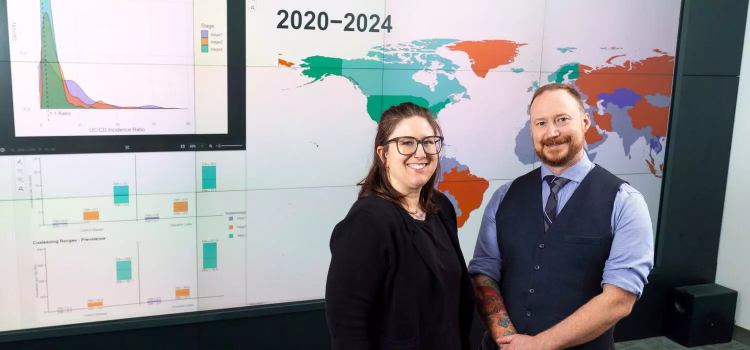When Dr. Lindsay Hracs, PhD, and Dr. Joseph Windsor, PhD, were working on their postgraduate studies in the division of Linguistics in the Faculty of Arts' School of Languages, Linguistics, Literatures and Cultures, they imagined they'd have fulfilling careers.
But they had no idea that Hrac's study of how a child's language changes over the course of development, and Windsor's exploration of the junction of sound and sentence structure, would lead to a ground-breaking paper on the evolution of inflammatory bowel disease (IBD) in a world-renowned publication.

Lindsay Hracs, left, and Joey Windsor. Photo Credit: Riley Brandt, University of Calgary
"I never thought I'd actually have a co-first authored publication in something like Nature," says Windsor. But that was before he met Dr. Gilaad Kaplan, MD, a clinical scientist in the Cumming School of Medicine, who hired him to provide writing and editing expertise in the area of knowledge translation, and to later join his epidemiology lab for his postdoc research.
"My entire lab is focused on creating multidisciplinary expertise," says Kaplan, a gastroenterologist and epidemiologist who specializes in IBD. "If everyone thinks about a problem in the exact same way, then we're only going to get certain types of solutions. But by bringing in people with diverse expertise we can tackle problems with unique approaches that lead to the kind of significant work like we published in Nature."
Applying a linguistic lens to global health data
While working on his postdoc in Kaplan's lab, Windsor kept seeing the same phrase in the research: the ratio of ulcerative colitis to Crohn's disease decreases over time.' "It seemed this was fairly ubiquitous," says Windsor. "It was just understood to be the case, but I never saw any actual research to support that. So, I started digging into the data."
Enter Hracs and her expertise in machine learning analytics and coding to conduct a systematic review of the data. "We've taken a bunch of already published studies, extracted the data from them, and fed it into a classifier to then essentially come up with these global stages of IBD evolution," she says.
"As a linguist, we are trained from the very intro class on pattern recognition. Right at your very initial experience with a linguistics class, you're in the weeds of data. And that is something I really love," she says.
Hracs' unique skill set in analyzing language data was "the piece of the puzzle" the lab needed. "Lindsay coming in with a machine learning lens allowed us to do a lot more than we had originally conceived," says Windsor. Looking into the recurring phrase about ratio "turned into this amazing paper."
Improving care for people with IBD around the world
The results a new understanding of how IBD is evolving around the world is crucial information that can improve care for millions of people, says Kaplan. "IBD develops in predictable patterns, which we can model within our mathematical framework. This lets us ask questions: What's happening to different parts of the world at different stages and how can we prepare our health-care systems for that rising burden of inflammatory bowel disease?"
The two linguists are thrilled to be working in the lab, bringing their background in studying language to have a "tangible impact" on people with IBD.
"In linguistics, we often end up working on problems that a few dozen people might find really interesting, and we might be advancing the field, but it may not have quite the same impact that we do working with health data," says Hracs. "To use my skills to drive policy change and to really have an impact on the health-care system is very rewarding."
For Windsor, who has IBD himself, there's personal satisfaction too. "When I first met Gil, I had had the disease for a decade, but I really knew next to nothing about it. I wasn't overly curious because it was well managed and I wasn't symptomatic but getting to work with IBD community groups around Canada to get their perspective, it has become something of a passion project."
Gilaad Kaplan, MD, is a professor in the departments of Medicine and Community Health Sciences at the Cumming School of Medicine (CSM), and a member of the Snyder Institute for Chronic Diseases and O'Brien Institute for Public Health at the CSM.








